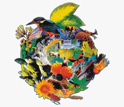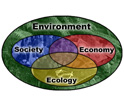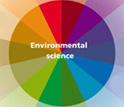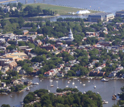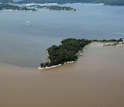News Release 11-158
NSF Grant Launches Center for Synthesizing Environmental and Related Research Results
Award funds efforts to develop solutions to today's environmental challenges
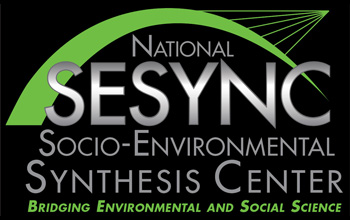
The National Science Foundation has funded a national center for environmental synthesis.
August 2, 2011
This material is available primarily for archival purposes. Telephone numbers or other contact information may be out of date; please see current contact information at media contacts.
To help identify solutions for today's most pressing environmental challenges, the National Science Foundation (NSF) recently funded a national synthesis center in Annapolis, Md., through a $27.5 million award to the University of Maryland.
The center is the newest in a series of synthesis centers--centers that bring together and meld research from many disciplines of science--funded by NSF over the last 15 years. It is the first of these centers to integrate the natural sciences and social sciences, previous centers focused on natural sciences only.
The National Socio-Environmental Synthesis Center, known as SESYNC, will be home to research on such issues as water availability, sustainable food production, and the interaction between human activities and ecosystem health.
The center is grounded in the philosophy that solutions to urgent environmental problems require cooperation among natural and social scientists and policy-makers.
A five-year award to University of Maryland will allow this multidisciplinary center to draw on the expertise of environmental, social and computational scientists, engineers and public policy experts through extensive national and international partnerships.
"SESYNC provides an unprecedented opportunity for researchers to combine information, ideas and concepts from disparate science and engineering fields into solutions for the complex environmental problems now confronting society," said Joann Roskoski, NSF acting assistant director for Biological Sciences.
"It will foster the development of tools and approaches to educate people at all levels about the importance of synthesizing research results," said Roskoski, "and will involve policy-makers, environmental managers and the private sector in the translation of scientific synthesis into societal benefit."
To address global environmental problems, fundamental, discovery-driven synthesis research must be combined with a commitment to communicate scientific insights to decision-makers and stakeholders, scientists at the new center believe.
At SESYNC, scientists and policy-makers will co-identify relevant research needs and ways to ensure that the products of fundamental discovery are linked to interactions among social and environmental scientists and decision-makers at all levels.
"The collaborations of this new center are exactly the kind of innovative, interdisciplinary approaches that are essential if we are to tackle the complex environmental challenges facing our nation and the world," said Wallace Loh, president of the University of Maryland at College Park.
"There is a fundamental mis-match between the specialization required for research excellence, and the integrated nature of today's global challenges," said Margaret Palmer, a University of Maryland environmental scientist who will direct the new center.
"This center will bridge that divide, synthesizing knowledge, data and methods from divergent disciplines with the unifying goal of creating effective, workable solutions."
SESYNC will support projects that enhance our understanding of how humans can thrive in the environments on which they depend.
Projects will address questions such as: what is the relationship between cultural values and conventions and the sustainability of natural resources like water? How do societies manage resources that cross human-defined political boundaries? How can governance systems effectively address these issues?
Complementing these syntheses, education and outreach research and activities will be integrated throughout the center's programs, with the goal of expanding the ability of researchers, students and stakeholders to integrate environmental science with social science research and knowledge.
The center's innovative goals will be accomplished through collaboration among environmental scientists and computer scientists at the University of Maryland at College Park; scientists and public outreach specialists at University of Maryland Center for Environmental Science; scientists at Resources for the Future; social scientists at the University of Michigan; educators at Coppin State University, Gallaudet University and Washington State University at Vancouver; and international partners in both developed and developing countries.
Through a partnership with computer scientists at the University of Maryland, the center will also advance the latest developments in information technology designed to foster collaboration among scientists and to place scientists and policy-makers on the same information plane.
Additional support for SESYNC is from the State of Maryland and the University System of Maryland.
-NSF-
-
The National Socio-Environmental Synthesis Center will synthesize information on the environment.
Credit and Larger Version -
Today's environmental challenges need a new scientific approach, one that melds expertise.
Credit and Larger Version -
Environmental, social, computational scientists, engineers, economists will work together.
Credit and Larger Version -
The new national center will be located in Annapolis, Md., pictured here.
Credit and Larger Version -
Scientists, policy-makers will work on sustainability practices for waterways like the Chesapeake.
Credit and Larger Version
Media Contacts
Cheryl Dybas, NSF, (703) 292-7734, email: cdybas@nsf.gov
Related Websites
National Socio-Environmental Synthesis Center (SESYNC): http://www.nsf.gov/funding/pgm_summ.jsp?pims_id=504694
National Evolutionary Synthesis Center (NESCent): http://www.nsf.gov/funding/pgm_summ.jsp?pims_id=13584&org=DBI&from=home
National Institute for Mathematical and Biological Synthesis (NIMBioS): http://www.nsf.gov/funding/pgm_summ.jsp?pims_id=503371&org=DBI&from=home
National Center for Ecological Analysis and Synthesis (NCEAS): http://www.nsf.gov/funding/pgm_summ.jsp?pims_id=13450&org=DBI&from=home
The U.S. National Science Foundation propels the nation forward by advancing fundamental research in all fields of science and engineering. NSF supports research and people by providing facilities, instruments and funding to support their ingenuity and sustain the U.S. as a global leader in research and innovation. With a fiscal year 2023 budget of $9.5 billion, NSF funds reach all 50 states through grants to nearly 2,000 colleges, universities and institutions. Each year, NSF receives more than 40,000 competitive proposals and makes about 11,000 new awards. Those awards include support for cooperative research with industry, Arctic and Antarctic research and operations, and U.S. participation in international scientific efforts.
Connect with us online
NSF website: nsf.gov
NSF News: nsf.gov/news
For News Media: nsf.gov/news/newsroom
Statistics: nsf.gov/statistics/
Awards database: nsf.gov/awardsearch/
Follow us on social
Twitter: twitter.com/NSF
Facebook: facebook.com/US.NSF
Instagram: instagram.com/nsfgov



